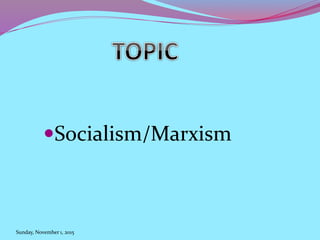Marxism is a socialist movement founded by Karl Marx and Frederick Engels that aims to emancipate the working class from domination by the bourgeoisie. Marx believed that class is defined by one's relationship to the means of production, and identified the proletariat and bourgeoisie as the main social classes under capitalism. Marxism views material reality and economic conditions as the primary determinants of social and political structures. While Marx did not write directly about education, his ideas implied that education should aim to transform society, involve all people in revolution, and prepare individuals to challenge the ruling class. Critics argue that Marxism neglects human nature and conditions, and lacks academic freedom for students.













